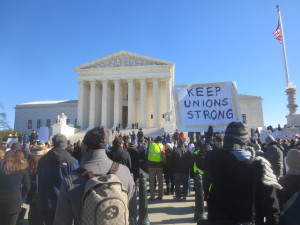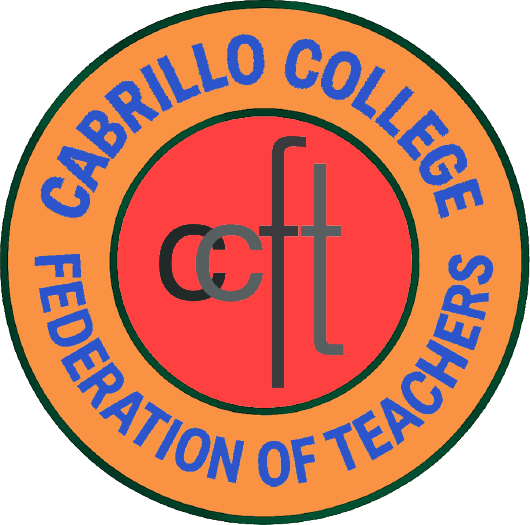CCFT Flex Week Events
CCFT flex week events saw sizable turnout this January. Things kicked off the day after Martin Luther King Jr. holiday with Tuesday’s part-timer luncheon and its some fifty attendees. The CCFT luncheon saw a terrific turnout on a beautiful day at the hilltop Horticulture Center. I saw colleagues from across campus as soon as I arrived and had conversations with several members in line for the delicious tamales, enchiladas, and braised chicken. FACCC Executive Director Jonathan Lightman, the featured speaker of the day, held forth in a informative talk covering Governor’s initial state budget, the pending Friedrichs v. CTA ruling from Supreme Court, as well as its possible consequences for a wide variety of union and public sector issues, including so-called pension “reform.” Indeed what a difference a month makes, as now Justice Scalia’s death means that Friedrichs v. CTA is on hold for the time being and the public sector unions have effectively had a near miss with a supreme court asteroid.
Introduced by FACCC executive board member and Cabrillo instructor John Govsky, Lightman highlighted some of the key elements in Brown’s initial budget numbers for California Community Colleges—including $20 0 million in new funds for the Workforce Task Force. But aside from these monies and a few other items, Lightman was unenthused by these first budget numbers, which will certainly change in some regards by the time of the May budget revise. COLA and growth funds are both included in the budget, so colleges can keep up with ongoing growth costs, but, as Lightman has noted in a recent article, “what didn’t make it into the budget tells a larger story: full-time faculty, part-time faculty support, restoration of CalWORKs, additional base support to help with ongoing STRS and PERS increases, and additional student financial aid.” Neither Student Success nor Equity are slated for any increases.
0 million in new funds for the Workforce Task Force. But aside from these monies and a few other items, Lightman was unenthused by these first budget numbers, which will certainly change in some regards by the time of the May budget revise. COLA and growth funds are both included in the budget, so colleges can keep up with ongoing growth costs, but, as Lightman has noted in a recent article, “what didn’t make it into the budget tells a larger story: full-time faculty, part-time faculty support, restoration of CalWORKs, additional base support to help with ongoing STRS and PERS increases, and additional student financial aid.” Neither Student Success nor Equity are slated for any increases.
Update on Friedrichs v. CTA
The arguments in the Friedrichs case were heard in January as well, and (as I previously noted) it did not look good for our union. The right-wing justices on the Supreme Court clearly telegraphed that a five-justice majority is ready to throw out forty years of precedent in Abood and abandon the principle of agency fee. The question, as Lightman noted, was just how bad Friedrichs would be. Lightman framed this point with a sharp question: “Will Friedrichs v. CTA wreak havoc on organized labor’s influence in California politics or will its effect be negligible?” The Friedrichs case had gone from being especially important for labor activists like CCFT’s own John Govsky, who visited DC as part of the AFT’s demonstration during the arguments phase of the court, to being a crucial issue likely to define the future of the public sector from California to New York.
But then a thunderbolt of untimely death changed all that in the near term. Justice Antonin Scalia, who was vacationing with a European-aristocratic hunting society at a Texas ranch, was found dead in his room by his host who had business before the court. All of a sudden the anti-union zealots pressing the Friedrichs case were stymied.
These zealots have already faced defeats at the ballot box, as when then-governor Arnold Schwarzenegger unsuccessfully pushed four ballot propositions against unions. Voters soundly defeated them a decade ago in part because of robust actions made possible by the money power of the unions. But can we expect more ballot box actions against organized labor?
Pension “Reform” and the Struggle Ahead
Just this past fall former San Jose Mayor and conservative Democrat Chuck Reed withdrew an initiative that would have gutted defined-benefit pensions for the public sector. Why did he and his wealthy backers withdraw the initiative? Lightman speculated that they might have been waiting to see what happened with Friedrichs; two or three years from now they perceived an even better opportunity to attack our pensions once the financial decline of the union had set it. Now the unions will not be financially degraded enough for this to happen. But we may also face another proposition attacking our pensions.
The near death experience of the Friedrichs case should teach our union a few different compelling lessons. Shamus Cooke has recently argued that the unions should continue to be vigilant, because the attacks are likely to continue.  Cooke writes, “Unions can’t assume the next Justice won’t be another Scalia. The worst should be prepared for; being unprepared last time nearly cost labor its head. The same corporate groups who backed Friedrichs will try again, soon, with a fresh case, new plaintiff, and possibly facing an equally anti-union Supreme Court.” He goes on to point out that President Obama is very unlikely to appoint a justice who would be the left equivalent of Scalia; more likely is another centrist, like Justice Kagan, or possibly a corporate lawyer with little political track record and latent hostility toward labor.
Cooke writes, “Unions can’t assume the next Justice won’t be another Scalia. The worst should be prepared for; being unprepared last time nearly cost labor its head. The same corporate groups who backed Friedrichs will try again, soon, with a fresh case, new plaintiff, and possibly facing an equally anti-union Supreme Court.” He goes on to point out that President Obama is very unlikely to appoint a justice who would be the left equivalent of Scalia; more likely is another centrist, like Justice Kagan, or possibly a corporate lawyer with little political track record and latent hostility toward labor.








